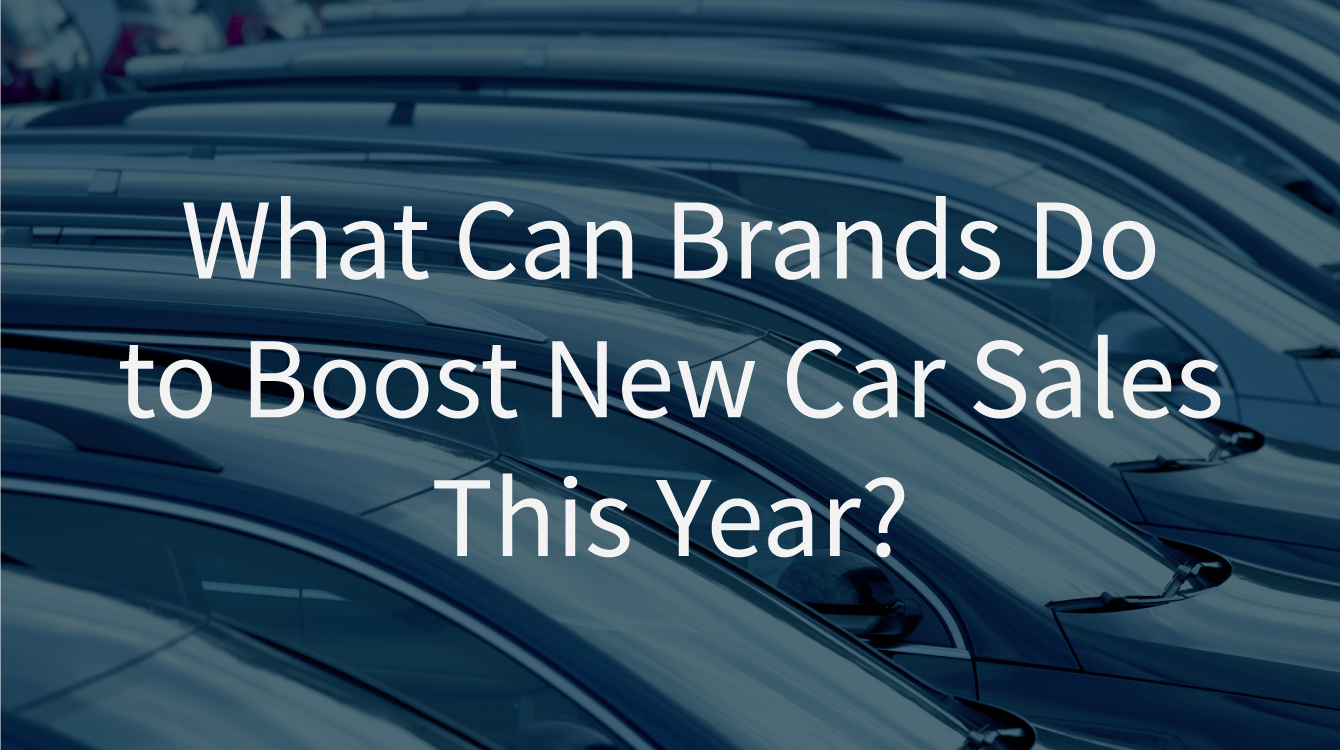
Articles | May 20, 2020 | 4 min read
What Can Brands Do to Boost New Car Sales This Year?
Every carmaker in the United States wants to boost new car sales this year. However, very few know what they should do to get consumers back onto the car lot.
At Zeta, we have some interesting ideas for the automotive industry to consider.
But before we share those ideas, we want to give you a glimpse at the state of the vehicle business.
New car sales are up 11% since the end of March, which is a good sign.
Spurred by expanded online purchase options, aggressive advertising, and lucrative incentives, consumers are finding a way to buy new cars despite record-unemployment, social distancing, and a recession.
Financial incentives like these…
…have been especially effective at keeping consumers engaged with the industry, and—so far—the decline in new sales related to the American economic shutdown is far lower than projected.
To date, new vehicle sales across the industry are down 30% overall in 2020 compared with 2019, and the sector has lost more than $125 billion dollars in market cap.
As a result of lost sales, production shutdowns, stock devaluation and other contributing factors, many of the industry’s biggest brands—from OEMs like Ford to component suppliers like Goodyear—delivered dismal earnings statements for Q1 2020.
Here are a handful of the lowlights:
To boost new car sales this year, Zeta believes there are at least 5 things to be done.
Hitting consumers with traditional financial incentives (e.g. no money down, 0% financing, etc.) is helping jumpstart new vehicle sales.
But given the unprecedented economic consequences of coronavirus, carmakers and dealers will benefit even more by going beyond the traditional with less common incentives like short-term leasing, career-specific promotions (e.g. free service for life for nurses), etc.
Dramatic shifts in the consumer market mean automotive marketers cannot rely on the tools, channels, and big budgets of the past—precision, ROI-obsessed marketing will be the way forward.
To that end, automotive marketers need to look at…
Consumers aren’t interested in hearing the automotive industry acknowledge the chaos created by COVID-19, but they are interested in hearing what the automotive industry is doing about it.
That means no more marketing campaigns highlighted by “images of empty streets, voice-overs that invoke ‘these uncertain times,’ and company promises to be there for [customers].”
The industry needs to push action-oriented marketing that highlights tangible, customer-centric changes—more hygienic manufacturing, online buying options, lower prices, etc.
Brands that embraced online sales years ago like Tesla and Carvana are doing well despite the recession. Now the world’s leading automotive brands are taking notice.
The lesson?—It’s time to digitize as much of the car buying process as possible.
Sure, consumers value test drives, but that doesn’t mean they want to do everything (e.g. paperwork, financing, etc.) at the dealership. By migrating more of the sales process online, carmakers can move inventory during the COVID-19 crisis. They will also be more successful in improving customer satisfaction.
In addition to being a long-term benefit, many industry executives like Mark Steawart, chief operating officer of North America for Fiat Chrysler Automotive, feel the rapid adoption of online selling tools will help reinvigorate the industry, and drive a “significant number of sales” in 2020.
These buying audiences will be more receptive to well-planned marketing campaigns than others. For automotive brands, it will be important to not only target these audiences, but target high-intent individuals within these audiences going forward.
Perhaps nothing can do more for an automotive business looking to boost new car sales this year than a dynamic marketing platform. One that makes use of robust data, artificial intelligence, and machine learning to deliver on customer wants, needs, and expectations.
The right platform powered by the right data can monitor the behavior—especially online—of consumer’s interest in things like…
Using this kind of intent-based data, OEMs and dealers can develop messaging that better connects with customers based on where they are in the buyer-cycle.
With auto brands forced to optimize their resources and processes in response to the economic slowdown created by COVID-19, capitalizing on intent-based data will make it easier to attract net-new customers and regain lost revenue.
At Zeta, we have some interesting ideas for the automotive industry to consider.
But before we share those ideas, we want to give you a glimpse at the state of the vehicle business.
The good news is…things aren’t as bad as they could be
New car sales are up 11% since the end of March, which is a good sign.
Spurred by expanded online purchase options, aggressive advertising, and lucrative incentives, consumers are finding a way to buy new cars despite record-unemployment, social distancing, and a recession.
Financial incentives like these…
- GM and Fiat Chrysler Automotive are offering 0% financing for seven years.
- Ford and BMW are letting new car buyers delay their first payment for 90 days.
- Infinity and Jaguar are offering zero-interest loans for up to 72 months.
…have been especially effective at keeping consumers engaged with the industry, and—so far—the decline in new sales related to the American economic shutdown is far lower than projected.
The bad news is…things are still looking pretty rough
To date, new vehicle sales across the industry are down 30% overall in 2020 compared with 2019, and the sector has lost more than $125 billion dollars in market cap.
As a result of lost sales, production shutdowns, stock devaluation and other contributing factors, many of the industry’s biggest brands—from OEMs like Ford to component suppliers like Goodyear—delivered dismal earnings statements for Q1 2020.
Here are a handful of the lowlights:
- General Motors — an 87% loss in net income quarter over quarter.
- Honda — 48% drop in sales in March 2020 versus March 2019.
- Hyundai — Sales slipped by 11% in Q1 2020 versus Q1 2019.
- Goodyear — Quarterly new loss of $619 million dollars.
- Ford — Q1 2020 net loss of $2 billion dollars.
- BMW — A 15% decline in new vehicle sales.
What brands should do to boost new car sales this year
To boost new car sales this year, Zeta believes there are at least 5 things to be done.
Diversify financial incentives
Hitting consumers with traditional financial incentives (e.g. no money down, 0% financing, etc.) is helping jumpstart new vehicle sales.
But given the unprecedented economic consequences of coronavirus, carmakers and dealers will benefit even more by going beyond the traditional with less common incentives like short-term leasing, career-specific promotions (e.g. free service for life for nurses), etc.
Invest in new marketing resources
Dramatic shifts in the consumer market mean automotive marketers cannot rely on the tools, channels, and big budgets of the past—precision, ROI-obsessed marketing will be the way forward.
To that end, automotive marketers need to look at…
- Emerging tools like acquisition email
- Underutilized channels like connected TV
- Identity-focused campaigns that use behavioral, transactional, and contextual signals to reach individual car buyers with the right message at the right time in real time.
Develop marketing centered on health, safety, and independence
Consumers aren’t interested in hearing the automotive industry acknowledge the chaos created by COVID-19, but they are interested in hearing what the automotive industry is doing about it.
That means no more marketing campaigns highlighted by “images of empty streets, voice-overs that invoke ‘these uncertain times,’ and company promises to be there for [customers].”
The industry needs to push action-oriented marketing that highlights tangible, customer-centric changes—more hygienic manufacturing, online buying options, lower prices, etc.
Digitize as much of the car-buying experience as possible
Brands that embraced online sales years ago like Tesla and Carvana are doing well despite the recession. Now the world’s leading automotive brands are taking notice.
The lesson?—It’s time to digitize as much of the car buying process as possible.
Sure, consumers value test drives, but that doesn’t mean they want to do everything (e.g. paperwork, financing, etc.) at the dealership. By migrating more of the sales process online, carmakers can move inventory during the COVID-19 crisis. They will also be more successful in improving customer satisfaction.
In addition to being a long-term benefit, many industry executives like Mark Steawart, chief operating officer of North America for Fiat Chrysler Automotive, feel the rapid adoption of online selling tools will help reinvigorate the industry, and drive a “significant number of sales” in 2020.
Create catered offerings to seniors, commuters, and people with young families
- Seniors are most at-risk for COVID-19.
- Commuters are most interested in buying new vehicles.
- Parents are compelled to protect their children.
These buying audiences will be more receptive to well-planned marketing campaigns than others. For automotive brands, it will be important to not only target these audiences, but target high-intent individuals within these audiences going forward.
Deploy a more dynamic marketing platform to boost new car sales this year
Perhaps nothing can do more for an automotive business looking to boost new car sales this year than a dynamic marketing platform. One that makes use of robust data, artificial intelligence, and machine learning to deliver on customer wants, needs, and expectations.
The right platform powered by the right data can monitor the behavior—especially online—of consumer’s interest in things like…
- New vehicles
- Lease rates
- Model upgrades
- Finance offers
Using this kind of intent-based data, OEMs and dealers can develop messaging that better connects with customers based on where they are in the buyer-cycle.
With auto brands forced to optimize their resources and processes in response to the economic slowdown created by COVID-19, capitalizing on intent-based data will make it easier to attract net-new customers and regain lost revenue.


